unit1grammar1
高一英语Unit 1 grammar直接引语与间接引语-人教版[整理]
![高一英语Unit 1 grammar直接引语与间接引语-人教版[整理]](https://img.taocdn.com/s3/m/8c5ea96ea45177232f60a278.png)
Conclusion
1. 当主句的谓语动词是一般现在时的时候 2. 当主句的谓语动词是将来时的时候 3. 当直接引语部分带有具体的过去时间状 语时 4. 当直接引语中有以when, while引导的从 句,表示过去的时间时 5. 当直接引语是客观真理或自然现象时 6. 当引语是谚语、格言时 7. 当直接引语中有情态动词should, would, could, had better, would rather, might, must, ought to, used to, need时
Tom
said that they were listening to the pop music. Mother asked, “Have you finished your homework before you watch TV?” Mother asked me whether I had finished my homework before I watched TV.
Our teacher said to us, “Light travels faster than sound. ” Our teacher told us that light travels faster than sound. He said,“Practice makes perfect. ” He said that practice makes perfect. He said, “She must be a teacher. ” He said that she must be a teacher. The doctor said, “You'd better drink plenty of water. ” The doctor said I'd better drink plenty of water.
英语七年级上册 Unit 1 Grammar 1【牛津版】【精品课件】1

一般现在时
Simple present tense (to be)
Read the new words loudly!
eat maths walking lunchtime day always usually sometimes
-
fish walk fly every drawing weekend run often
总结:Simple present
tense of the verb ”to be”
I am a teacher.
am is are
肯定句 I am… He/she/it is… We/you/they are…
Sandy’s hair is long and black.
否定句 I am not… He/she it isn’t… We are in the classroom. We/you/they aren’t… 疑问句 Are you/we/they……? 表示目前的状态或客观事实 Is he/she/it……?
be 后+形容词
• Sandy is from China. be 后+介词短语 • We are in Class One, Grade Seven. • The girls are behind the trees.
• some exercises .
补充习题 Page5 A1
把下列句子改为否定句:
I _____ he _____ we _____ Amy_____ you _____ she _____ it _____ you _____ they _____ my parents_____
人教版高中英语必修一unit1grammar
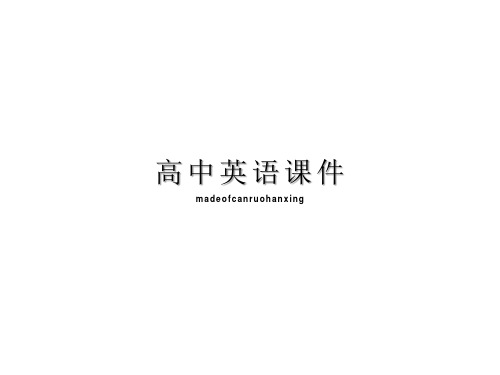
Whenyouchangeasentencefromdirects peechtoindirectspeech,yousometimes needtochangetheverbtense.Youmayal soneedtochangepronouns,timeinorder
tokeepthesamemeaning.
“Idon’tlikecomputers,”Sarahsaidtoherfriends.
Sarahsaidtoherfriends that Idon’tlike
computers. Sarah said
she
didn’t
Sarahsaidtoherfriendsthatshedidn’tlikecomput ers.
he
harvested Theyaskedhimwhenheharvestedthewheat.
选择疑问句
•用whether…or…表达,而不用if…or…,也 不用either…or… • Heasked,“DoyouspeakEnglishorFrench?”
• HeaskedmewhetherIspokeEnglishorFrenc h.
3.Tomsaid“Iwillseeyounextweek.” Tomsaidthathewouldseemethenextweek.
4.“Whywereyoulateagain?”Theteachersaidtome. TheteacheraskedmewhyIwaslateagain.
5.“Idon’tlikeswimming,”saidSarah. Sarahsaidshedidn’tlikeswimming.
一般疑问句
•间接引语用连词whether或if引导,原主句中 谓语动词said要改为asked(me/him/us等), 语序是陈述句的语序
高一英语必修一Unit1Grammar语法直接引语间接引语
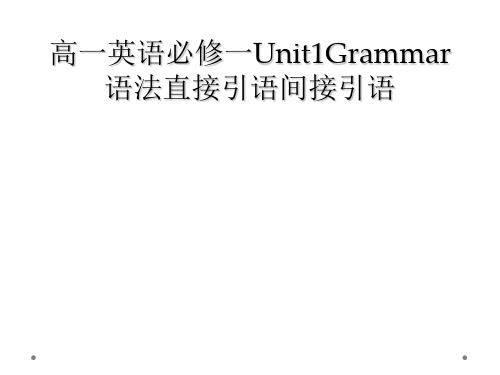
仍用一般现在时。例如: Teacher said to us:" The moon moves round
the earth." Teacher told us the moon moves round the earth. The teacher said to us : “Light travels faster
宾语从句
判断以下哪些句子属于间接引语
She said that she didn’t want to be a teacher. 间接 She said, “I don’t want to be a teacher〞.直接 He said, “ I like playing football〞. 直接 He said that he liked playing football. 间接
3. Mr Black said, “I have walked a long way this week.〞 Mr Black said that __ a long way __. A. I had walked…last week B. he had walked…that week C. I walked…last week D. he has walked…this week
〞 • 间接引语 Mum told me that I could clean my bedroom the next day . • Mr. Smith said,“He is a good worker. ’’ • Mr. Smith said that he was a good worker.
3.人称的变化
• 直接引语里的第一人称和第二人称,变间接引语时,人称要做相 应调整。例如:
必修一 Unit 1 Grammar-句子成分及基本句子结构
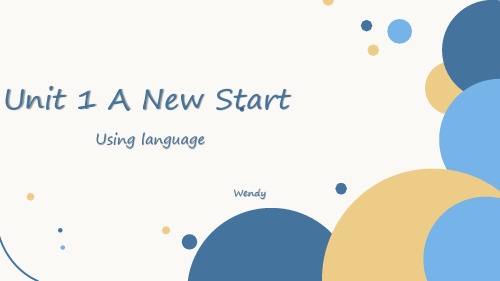
➢ e.g.
I will watch the movie.
He borrowed my key.
Time flies.
He can play basketball.
She quickly filled in the form.
句子成分
Unit 1 A new start Using language
句子成分
Unit 1 A new start Using language
表语或主语补足语 Subject complement
➢ 表语或主语补足语是接在联系动词(linking verb)之后的,用于补充说明主语所 处的状态的成分,一般由名词或形容词充当,整个句子构成所谓的“主系表”结构。 联系动词除了可以用be动词(am, is, are)构成之外,还可以用感官动词(smell, feel, taste…)充当。
c
4. I breathed deeply.
f
5. I looked at them in panic. g
6. I was embarrassed
a
7. His words made me a lot more relaxed! b
a He was friendly. b The exam made me quite nervous. c I passed him a book. d She agreed. e He wrote a long letter. f He talked loudly. g She looked after her sister patiently.
小试牛刀
造句练习
Unit 1 A new start Using language
M1 Unit 1 Grammar (1)学案
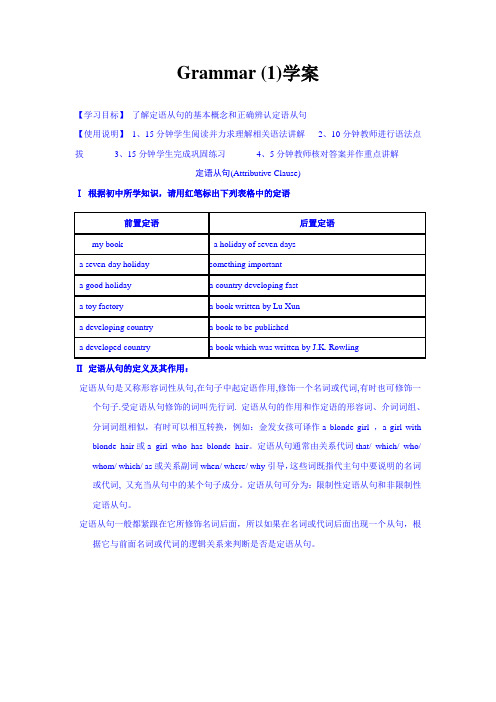
Grammar (1)学案【学习目标】了解定语从句的基本概念和正确辨认定语从句【使用说明】1、15分钟学生阅读并力求理解相关语法讲解2、10分钟教师进行语法点拔3、15分钟学生完成巩固练习4、5分钟教师核对答案并作重点讲解定语从句(Attributive Clause)Ⅰ根据初中所学知识,请用红笔标出下列表格中的定语Ⅱ定语从句的定义及其作用:定语从句是又称形容词性从句,在句子中起定语作用,修饰一个名词或代词,有时也可修饰一个句子.受定语从句修饰的词叫先行词. 定语从句的作用和作定语的形容词、介词词组、分词词组相似,有时可以相互转换,例如:金发女孩可译作a blonde girl ,a girl with blonde hair或a girl who has blonde hair。
定语从句通常由关系代词that/ which/ who/ whom/ which/ as或关系副词when/ where/ why引导,这些词既指代主句中要说明的名词或代词, 又充当从句中的某个句子成分。
定语从句可分为:限制性定语从句和非限制性定语从句。
定语从句一般都紧跟在它所修饰名词后面,所以如果在名词或代词后面出现一个从句,根据它与前面名词或代词的逻辑关系来判断是否是定语从句。
找出下列句中的定语从句;分析定语从句三要素1. You are the right man whom we are looking for.2. I’ve spent all the money that was given by my parents.3. I will never forget the day when I joined the party.4. This is the factory where the machines are made.Ⅳ 关系代词的用法:Ⅴ 课堂练习 12关系词 3关系词在从句中充当成分relative pron. (as sub. ,obj. ,pred.)(that 指人或物 / which 指物 / who(m) 指人/ whose)relative adv. (as adverbial)(when / where / why)Ⅲ 定语从句的必备三要素1 找出下列各句中的定语从句,并分析其先行词:1 The fan that you want is on the desk.2 The woman you saw in the park is our geography teacher.3 Here is the girl whose brother works in this shop.4 That’s the child whose drawing we were looking at just now.5 This is the boy whose sister is a famous singer.2 把下列每对句子合并成含有定语从句的主从复合句1. The man is in the next room. He brought our textbooks here yesterday.2. The magazine is mine. He has taken it away.3. The students will not pass the exam. They don’t study hard.4. The letter is from my sister. I received it yesterday.5. The play was wonderful. We saw it last night.6. The train was late. It was going to Nanning.。
Unit1Grammar课件牛津译林版英语九年级上册
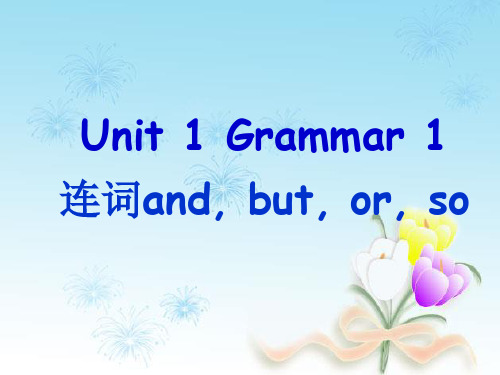
get any milk.
*16. Excuse me, _b_u_t__ could you show me
how to use the machine?
both either neither none all any的用法
I am active and energetic, and I love working with people.
Let’s join the two sentences together.
1. He doesn’t like to talk much. 2. His work shouts!
(but) join two different ideas
◆ We use ‘so’ to express the result of something. Attention: If the two subjects and verbs are the same, we do not need to repeat the first ones when we join ideas together with and, but and or .
两者
三者或三者以上
任何一个
either
any
都
both
all
任何一个都不
neither
none
作不定代词 either/both/neither/any/ all/ of sth. (sb.) 名词复数
both of us neither of the twins either of the two answers
8. — Have you seen Tom and Mary? —No, I haven seen _n_e_it_h_e_r__ of them.
牛津译林版八年级英语上Unit1 Grammar1课件

不规则变法
little far old
Complete the table .
adjective funny
good happy
comparative
funnier
superlative
funniest best happiest
better
happier
interesting
large
more interesting most interesting larger smarter redder largest smartest reddest
worst worse bad 最差的 更差的 Which flower is ______, worse this one or that one ? That flower is ________ the ,更糟的 worse adj. 最差的,最糟的 worst n. 高,高度 height /ai/ n. 重量 weight /ei/ n. 秒(=second) Sec. competition n. 竞赛,比赛,竞争 v./n. 测试,考查 test n. 游泳者 swimmer
1. We use comparatives + than to compare two people or things. e.g. Tom is cleverer than Daniel. This film is more interesting than that one.
We add -er / -est after short adjectives. We use more/ most before long adjectives.
zxxk
How tall the woman is!
九年级英语Unit 1 Grammar译林出版社知识精讲
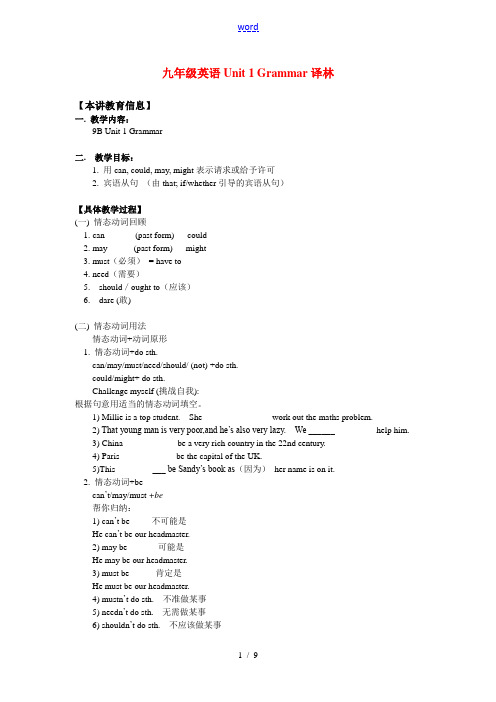
九年级英语Unit 1 Grammar译林【本讲教育信息】一. 教学内容:9B Unit 1 Grammar二. 教学目标:1. 用can, could, may, might表示请求或给予许可2. 宾语从句(由that; if/whether引导的宾语从句)【具体教学过程】(一) 情态动词回顾1. can (past form) could2. may (past form) might3. must(必须)= have to4. need(需要)5. should/ought to(应该)6. dare (敢)(二) 情态动词用法情态动词+动词原形1. 情态动词+do sth.can/may/must/need/should/ (not) +do sth.could/might+ do sth.Challenge myself (挑战自我):根据句意用适当的情态动词填空。
1) Millie is a top student. She _______________ work out the maths problem.2) That young man is very poor,and he’s also very lazy. We _______________ help him.3) China ____________be a very rich country in the 22nd century.4) Paris ____________ be the capital of the UK.5)This ___________ be Sandy’s book as(因为)her name is on it.2. 情态动词+becan’t/may/must +be帮你归纳:1) can’t be 不可能是He can’t be our headmaster.2) may be 可能是He may be our headmaster.3) must be 肯定是He must be our headmaster.4) mustn’t do sth. 不准做某事5) needn’t do sth. 无需做某事6) shouldn’t do sth. 不应该做某事ought not to do sth.比较句意:This may not be true.This cannot be true.Such things may happen.Such things can happen.It must have rained last night.极限挑战:1) The singer must be Pan Weibo. (否定句)The singer ______ (mustn’t/can’t)be Pan Weibo.2) ---Must we catch a bus there?a. (肯定回答)---Yes,you _________. (must/need)B. (否定回答)---No,you __________. (mustn’t/needn’t)You can also go there by bike.3) ---Could you help me with my drawing?---Yes, I could.---No, I couldn’t. (对吗?)小结:情态动词有can(could), may (might),must, shall , should, will (would),ought to, need, dare 等。
译林版高一英语必修第一册(2019版)_Unit1_Grammar_同步练习
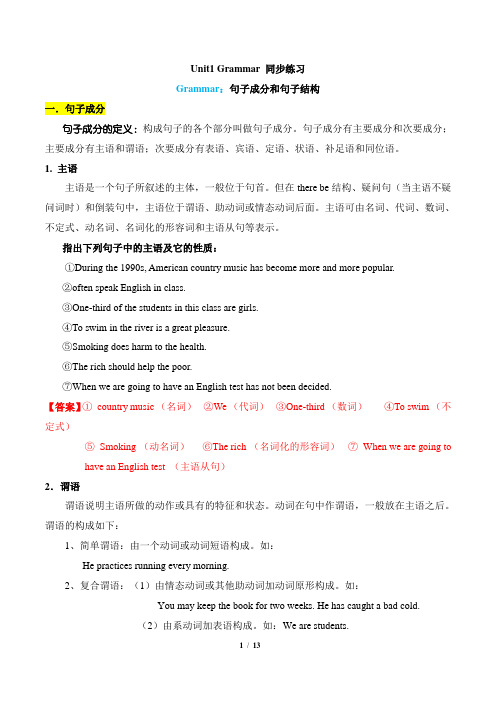
Unit1 Grammar 同步练习Grammar:句子成分和句子结构一.句子成分句子成分的定义:构成句子的各个部分叫做句子成分。
句子成分有主要成分和次要成分;主要成分有主语和谓语;次要成分有表语、宾语、定语、状语、补足语和同位语。
1. 主语主语是一个句子所叙述的主体,一般位于句首。
但在there be结构、疑问句(当主语不疑问词时)和倒装句中,主语位于谓语、助动词或情态动词后面。
主语可由名词、代词、数词、不定式、动名词、名词化的形容词和主语从句等表示。
指出下列句子中的主语及它的性质:①During the 1990s, American country music has become more and more popular.②often speak English in class.③One-third of the students in this class are girls.④To swim in the river is a great pleasure.⑤Smoking does harm to the health.⑥The rich should help the poor.⑦When we are going to have an English test has not been decided.【答案】①country music (名词)②We (代词)③One-third (数词)④To swim (不定式)⑤Smoking (动名词)⑥The rich (名词化的形容词)⑦When we are going tohave an English test (主语从句)2.谓语谓语说明主语所做的动作或具有的特征和状态。
动词在句中作谓语,一般放在主语之后。
谓语的构成如下:1、简单谓语:由一个动词或动词短语构成。
如:He practices running every morning.2、复合谓语:(1)由情态动词或其他助动词加动词原形构成。
高中英语 Unit1 Grammar课件 牛津译林版必修1
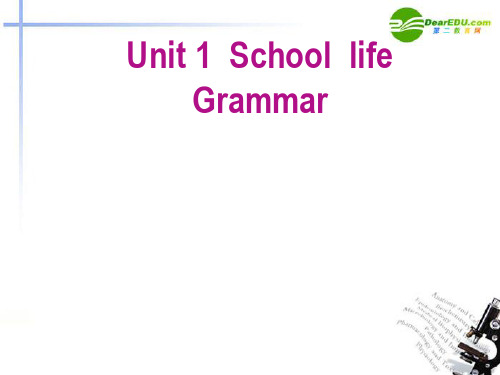
She is an experienced teacher.
二、句 子的种类
1、简单句
(只有一个谓语动词)
2、并列句
(有两个谓语动词以上, 用并列连词连接起来, 他们的地位是平列的)
She is laughing.
主 + 谓(vi)
She opened the door. 主 + 谓(vt) + 宾
that 的特殊用法:
1. 先行词为all everything anything nothing any more one等不定代词(指物) 2. 先行词被all every no some any little much 等词修饰(指物) 3. 先行词被序数词或形容词最高级修饰 或者先行词本身为序数词或最高级。 4. 先行词被the only, the last, the very, the same 等修饰的时候 5. 先行词既有人又有物 6. 主句是以who 或which 等开头的特殊疑问句 7. 关系代词在定于中做表语 8. 先行词为time(次数)和way(方法)时
主谓 一致
1.从句中谓语要注意和先行词保持数和时态上的一致
2. one of …
复数
the (only) one of … 单数
I, who_a_m___ (be) your close friend, will try my best to help you out. He who_d_o_e_s__ (do) not reach the Great Wall is not a true man. Mr. Herpin is one of the foreigners who _a_r_e_ (be) working in China. Mr. smith is the only one of the those foreigners who __is___ (be) working in China.
book1 unit1 grammar直接引语和间接引语
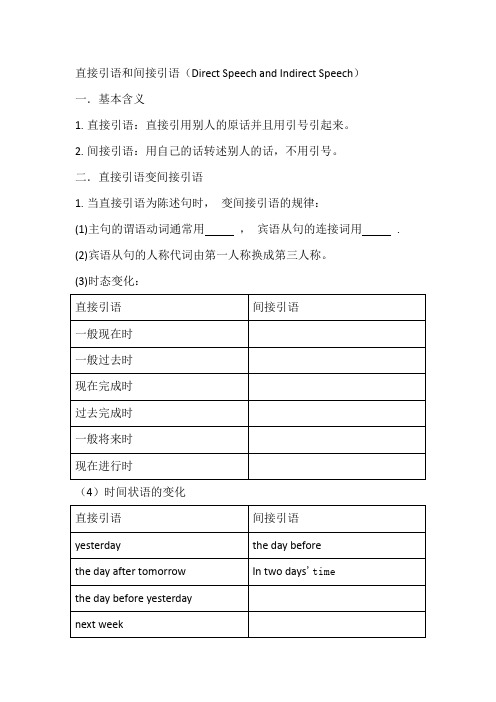
直接引语和间接引语(Direct Speech and Indirect Speech)一.基本含义1.直接引语:直接引用别人的原话并且用引号引起来。
2.间接引语:用自己的话转述别人的话,不用引号。
二.直接引语变间接引语1.当直接引语为陈述句时,变间接引语的规律:(1)主句的谓语动词通常用,宾语从句的连接词用.(2)宾语从句的人称代词由第一人称换成第三人称。
(3)时态变化:(4)时间状语的变化(5)地点状语的变化(6)指示代词的变化(7)方向性动词的变化Eg . “I don't want to set down a series of facts in a diary,”Said Anne. (变间接引语)注意:当直接引语为客观事实,普遍真理时,变间接引语时时态不变。
Eg. He said, “Light travels much faster than sound.”→He said that light (travel) much faster than sound.2.当直接引语为一般疑问句时,变间接引语的规律主句的谓语动词通常用, 宾语从句的连接词用引导,并且用陈述语序。
主语的人称,时态,状语等也要做相应的变化。
Eg. He said,”Are you interested in English ?”(变间接引语)3.当直接引语为特殊疑问句时,变间接引语的规律主句的谓语动词用,从句依然用原来的特殊疑问词引导,语序要用,其人称,时态,状语等也要做相应的变化。
Eg. “What do you want ?”he asked me. (变为间接引语)4.当直接引语是祈使句时,变间接引语的规律通常要借助于动词ask, order, tell 等其人称,时态,状语等也要做相应的变化。
Eg. The hostess said to us, “Please sit down”.(变为间接引语)练习:1.Mr Green asked Lily whether she had passed the exam .A.yesterdayB. the day beforeC. the day agoD.before the day2.(2014.厦门高一检测) He told us that there a football match at 19:00.A.were going to haveB. Is going to beC. will beD. was goingto be3.(2014.九江高一检测) “What has made these companies get into trouble?” He asked.→He asked .A.What had made these companies get into trouble.B.What made these companies get into trouble.C.What has made those companies get into trouble.D.What had made those companies get into trouble.4.(2014.南昌高一检测) I failed again, but my parents encouraged me and told me that failure the mother of success.A.wasB. isC. beD. has been5.(2014.杭州高一检测) “Have you ever been to the seaside ?”he asked me .→He asked me .A.Had I ever been to the seaside.B.Have I ever been to the seaside.C.Whether I had ever been to the seaside.D.If I have ever been to the seaside.6.He once told us that Shanxi aged vinegar (山西老陈醋)usually at least one year to produce.A.tookB. has takenC. takesD. Will take7.(2014.杭州高一检测)John asked me to visit his uncle's farmwith him.A.how would I likeB. if or not would I likeC. whether I would likeD. which I would like答案:1-7 bddbccc把下列直接引语变为间接引语1.“I never eat meat,”he said.→2.He said to me , “I have found my book.”→3.“What does he mean?”she asked.→4.Mr Green asked, “Jack, did you see the film yesterday?”→Mr Green asked Jack he had seen the film.5.“Please don't disturb me,”he said to the girl.→He the girl him.答案:1. He said that he never ate meat.2.He told me that he had found his book.3.She asked what he meant.4.whether the day before.5.Asked; not to disturb。
人教版九年级英语全一册知识梳理第一单元《Unit 1 Grammar》

Unit 1《HOW CAN WE BECOME GOOD LEARNERS?》语法精讲(一)介词by的用法1. by表示方式、方法或手段,后接名词或动名词,意为“使用某物;(做某事)靠...;乘(车、船)等”(用how 提问) 。
➩ Do you learn English by reading aloud?你通过大声朗读来学习英语吗?➩ I often go to school by bike. 我经常骑自行车去上学。
➩ — How can I turn on this light? 我怎么开这盏灯?— By turning this button. 转这个按钮。
2. by表示时间,意为“到……时(为止);在……以前、不迟于”。
如:➩ I have to go to bed by ten o'clock. 我必须10点前睡觉。
➩ Can you finish your work by the end of the day? 你能在今天前完成你的工作吗?3. by表示地点、位置,意为“靠近;在……旁边”。
如:➩ The boy often reads books by the river. 这个男孩经常在河边读书。
常连用的短语:by the way 顺便问一下by accident= by chance 偶然地by mistake 错误地by the time 到……为止by oneself 独自地by hand 用手by the end of 到.... 末尾go/pass by 通过;经过by与with, in的区别:◆with 的用法:表示用某种工具(1). with +工具We like to write with a pen.(2). with +人体部位We see with our eyes.◆in 的用法:通常与“衣着、声音、书写材料”等名称连用in+语言in English 用英语in ink 用墨水speak in a loud voice大声地讲in red 穿红色的衣服(二)动名词用法小结1. 动名词在句中作主语(1). 动名词作主语时,谓语动词用第三人称单数形式。
Unit 1 Grammar 1
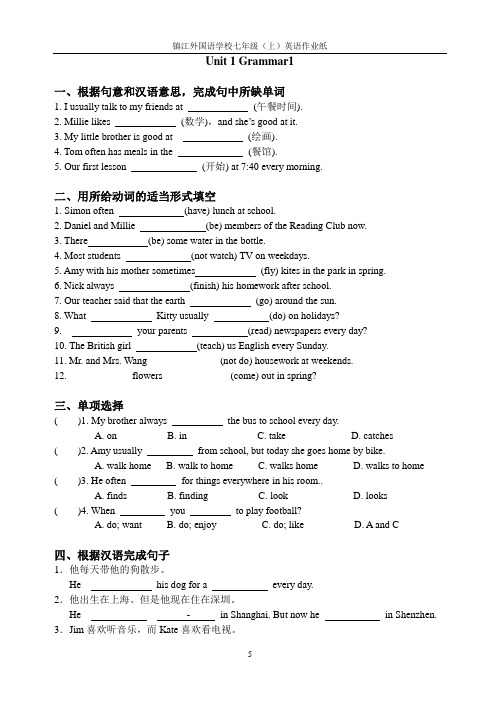
Unit 1 Grammar1一、根据句意和汉语意思,完成句中所缺单词1. I usually talk to my friends at ___ (午餐时间).2. Millie likes ___ (数学),and she’s good at it.3. My little brother is good at ___ (绘画).4. Tom often has meals in the ____ (餐馆).5. Our first lesson ____ (开始) at 7:40 every morning.二、用所给动词的适当形式填空1. Simon often ____ (have) lunch at school.2. Daniel and Millie ____ (be) members of the Reading Club now.3. There ____ (be) some water in the bottle.4. Most students ___ (not watch) TV on weekdays.5. Amy with his mother sometimes ___ (fly) kites in the park in spring.6. Nick always ___ (finish) his homework after school.7. Our teacher said that the earth ___ (go) around the sun.8. What ___ Kitty usually ____ (do) on holidays?9. ___ your parents ___ (read) newspapers every day?10. The British girl ___ (teach) us English every Sunday.11. Mr. and Mrs. Wang ______________(not do) housework at weekends.12. ____________ flowers_____________ (come) out in spring?三、单项选择( )1. My brother always the bus to school every day.A. onB. inC. takeD. catches( )2. Amy usually from school, but today she goes home by bike.A. walk homeB. walk to homeC. walks homeD. walks to home ( )3. He often for things everywhere in his room..A. findsB. findingC. lookD. looks( )4. When _ you to play football?A. do; wantB. do; enjoyC. do; likeD. A and C四、根据汉语完成句子1.他每天带他的狗散步。
Unit 1 Grammar(24页)英语牛津译林版七年级下册课件

4. 表示“几十”的基数词的复数形式,可用来表示某人几十多 岁或几十年代。 My uncle went to Suzhou in his twenties. 我叔叔二十几岁时去了苏州。 In the 1960s, people had to live a poor life. 在20世纪60年代,人们不得不过着贫困的生活。
hundred
million
thousand
billion
nine billion three hundred and five million and four thousand six hundred and seven
Rule2: 读三位或三位以上的数词时,要在十位前加 “and”,如果十位为0,则在个位前加“and”。
numbers 21 22 23 30 40 50 60 70 80 90 100
Cardinal numbers twenty-one twenty-two twenty-three thirty forty fifty sixty seventy eighty ninety a hundred
911 nine hundred and eleven 715 seven hundred and fifteen 4,056 four thousand and fifty-six 23,813 twenty-three thousand eight hundred and thirteen
A Simon is collecting some information about different countries. Help him r11 eleven 16 sixteen
12 twelve 17 seventeen
- 1、下载文档前请自行甄别文档内容的完整性,平台不提供额外的编辑、内容补充、找答案等附加服务。
- 2、"仅部分预览"的文档,不可在线预览部分如存在完整性等问题,可反馈申请退款(可完整预览的文档不适用该条件!)。
- 3、如文档侵犯您的权益,请联系客服反馈,我们会尽快为您处理(人工客服工作时间:9:00-18:30)。
foery formal
often used to ask permission could from strangers, old people,
teachers and bosses used in formal situations to ask may if it is OK to do sth
S: Mum, _c_o__u_l_d__ I use your computer? I want to search
for some information.
M: Sorry, you __c_a_n__’t__ use it now. I am busy. And I think youo_u__g_h_t_t_o____ spend more time on your homework.
—Yes, you may. 可以。
b) —Might I have a look at your new plan?
我可以看一下你的新计划吗?
— No, you may not. 不,不行。
Fill in the blanks
• This morning ×××was late. If he wanted to come into the classroom, he should say, “_M__a_y__I _c_o_m__e_i_n_?__”
S: _M__u_s_t_ I do it now? M: Well, you n__e_e__d_n_’_t. After lunch, you m__a__y_/_chaanve a rest.
a) —Could I use your computer, please? 请问,我可以用一下你的电脑吗?
—Yes, you can. 可以。
b) —Could I hand in our homework later, Mr Lin? 林老师,我可以稍后交作业吗?
—No, you can’t. 不,不行。
No, you _m__a_y__n_o_t
(couldn’t, may not).
__C_a_n____ (Might,
Can) I borrow your boots?
Yes, you
_c_a__n___ (can,
may).
After borrowing the things he needs, Simon speaks to his mum. Read the dialogue and fill in the blanks with may, can(not), must(not), needn’t, ought to.
2. may与might may也可以用来征求对方意见,意为 “可以”,相当于could,用法也比 can更正式,更礼貌,一般用于向陌生 人或所尊敬的人请求许可。如:
a) —May I ask you a question? 我可以问你一个问题吗?
—Yes, please. 可以,请问。
b) —May I come in, Mr Wu? 吴老师,我可以进来吗?
—Of course. 当然可以。
b) —Can I have some milk, Mum? 妈妈,我可以喝点牛奶吗?
could 是can的过去式,在口语中,could 常 用来代替 can向对方更委婉地提出请求,用 法上比can正式,可以用于向老师或长辈提 出请求,这时could不表示过去,回答一般 还是用can。如:
Can you show us what the two words mean? Could I use your dictionary?
Can I use your dictionary?
From the words above, we can know that we can use ‘can’, ‘could’, ‘may’, ‘might’ to talk about permission, and these four words have different degrees of formality.
—No, you can’t . 不行。
might是may的过去式,它也可以用来 表示征求对方意见,不过很少用。might 在语气上比may更婉转,但不如may表 现得那么自信,这时might不表示过去时 态,肯定回答时通常用may。如:
a) —Might I join you? 我可以加入你们吗?
Unit 1 Life on Mars Grammar 1
can, could, may, might 都可以用来表 示请求或给予许可。但 用法上有一些区别:
1. can与could can 常用于口语中,表示非正式的 请求,请求对象一般是家人或朋友。 如:
a) —Can I borrow your bike, Simon? 西蒙,我可以借一下你的自行车 吗?
• If I want to borrow a dictionary from a student, I should say, “____C__a_n__I_u_s_e__y_o_u_r_________ d_ic_t_i_o_n_a_r_y_?____”.
Now If a student wants to borrow a book from me, what should he/she say? ——Could I use your book, Mr Zhao? ——Yes, you ___c_a_n_____.
might very formal but seldom used
Dad, c_o__u_l_d
(may, could) I take your camera?
Yes, you _c_a_n_
(can, may).
_M__a_y___ (May, Can)
I borrow this helmet?
